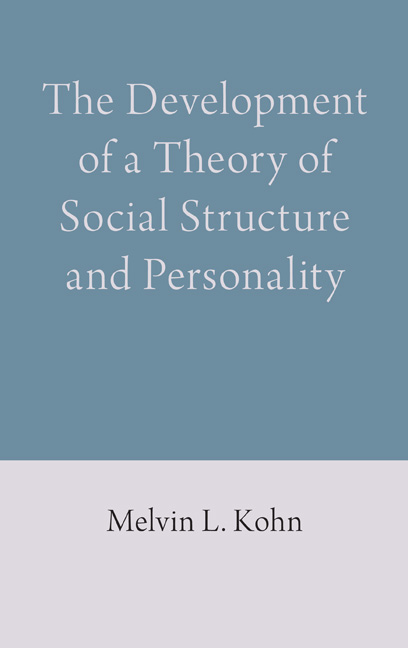Book contents
- Frontmatter
- Contents
- Preface
- 1 Hagerstown and Schizophrenia
- 2 Social Stratification and Parent–Child Relations in Washington, DC
- 3 The Torino Study
- 4 Men Employed in Civilian Occupations in the United States
- 5 The Transformation of the Occupations Study into a Longitudinal Analysis
- 6 Life on Sabbatical Leave in Norway and at the National Institute of Mental Health
- 7 Class, Stratification, and Personality
- 8 Poland under Communism
- 9 Occupational Self-Direction and Distress in Poland
- 10 The Vietnam War, Nixon, and Me
- 11 Japan
- 12 Germany – West and East
- 13 Poland and Ukraine in Transition to Capitalism and Democracy
- 14 The Presidency of the American Sociological Association, Ronald Reagan, and My Job Switch
- 15 My Two Exploratory Expeditions to China
- 16 China in Transition to a Modern Economy
- 17 Retirement, and My Last Sabbatical, at Deep Springs Junior College
- 18 The Theory I Propose
- Index
12 - Germany – West and East
Published online by Cambridge University Press: 12 July 2019
- Frontmatter
- Contents
- Preface
- 1 Hagerstown and Schizophrenia
- 2 Social Stratification and Parent–Child Relations in Washington, DC
- 3 The Torino Study
- 4 Men Employed in Civilian Occupations in the United States
- 5 The Transformation of the Occupations Study into a Longitudinal Analysis
- 6 Life on Sabbatical Leave in Norway and at the National Institute of Mental Health
- 7 Class, Stratification, and Personality
- 8 Poland under Communism
- 9 Occupational Self-Direction and Distress in Poland
- 10 The Vietnam War, Nixon, and Me
- 11 Japan
- 12 Germany – West and East
- 13 Poland and Ukraine in Transition to Capitalism and Democracy
- 14 The Presidency of the American Sociological Association, Ronald Reagan, and My Job Switch
- 15 My Two Exploratory Expeditions to China
- 16 China in Transition to a Modern Economy
- 17 Retirement, and My Last Sabbatical, at Deep Springs Junior College
- 18 The Theory I Propose
- Index
Summary
I must tell you from the start, that although I have had a long-standing interest in Germany, especially its language and its literature, I did not do a study there. By a wonderful coincidence, I was invited to be a member of the International Advisory Committee of the Institut für Bildungsforschung und Humanentwicklung (Institute for Educational Research and Human Development). My interest in Germany began with my favorite junior high school teacher, Miss Lillian Limbacher, who taught us German by teaching us how German grammar differed from English grammar. It continued on to Deep Springs, where Kurt Bergel had me translate Goethe and taught me the wonders of German literature, including that of his favorite poet, Rilke. It seemed a gift from heaven when the directors of the Institut invited me to be a member of its International Advisory Committee, with my way paid to Berlin for annual meetings every spring. In time, I learned that the heavenly gift was facilitated by the recommendation of a member of that board, Urie Bronfenbrenner, my former teacher, who recommended me as an advisor for sociology.
This appointment held huge advantages for me. For one thing, I was beginning to be involved in research in Poland, and the Germans offered me a way to get as far as Berlin, from which I could readily take subsidized trains from East Berlin to Warsaw (two socialist states with subsidized railway fares, second class, of course), thus making it more feasible for me to travel to Warsaw within my means – as I did for eight years, every spring. For another thing, West Germany was a center of sociological research, and I thoroughly enjoyed the opportunity to travel in West Germany and to lecture at many of the leading German universities – and thereby to learn of the research being done at those universities. For a third thing, I was fascinated by the split between West and East Germany, and became ever more interested as I learned how disinterested the West Germans were in learning anything much about what was happening in East Germany. And, most important, I was fascinated with German culture, German sociology, German food, all things German, and here was my golden opportunity to ingest them all.
- Type
- Chapter
- Information
- Publisher: Anthem PressPrint publication year: 2019



